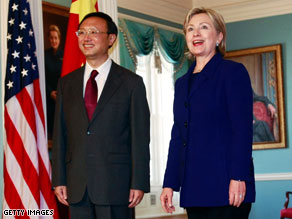
Japan’s economy shrank more than 12 percent last quarter, the government said on Thursday, in another sign of how severely the global economic downturn has affected the world’s second-largest economy.
“It has been a core belief of ours that every nation must not only live by, but help shape global rules that will determine whether people enjoy the right to live freely and participate to the fullest in their societies,” she said after a meeting with Chinese Foreign Minister Yang Jiechi, adding the United States itself “must continually strive to live up to our own ideals.” Both of them discussed China’s human rights record and situation in Tibet on the 50th anniversary of Tibet’s national uprising. They also talked about the global financial crisis and laid the groundwork for the first meeting between U.S. President Barack Obama and Chinese President Hu Jintao next month at the G-20 economic summit in London. Yang also met with Treasury Secretary Tim Geithner to discuss preparations for the summit. “The United States and China have a joint responsibility to help ensure that the summit yields tangible progress and concrete action steps toward a coordinated global response to stabilize the world’s economy and to begin a recovery,” Clinton said. Clinton also said she and Yang agreed on the importance of reducing tensions and avoiding a repeat incident of the confrontation last weekend between Chinese and U.S. vessels in the South China Sea. Despite sticking to their respective versions of the confrontation, the two agreed not to let the incident have “consequences that are unforeseen.” Clinton took her maiden voyage abroad as secretary of state to Asia last month, where she was criticized for a lower-key approach that seemed to downplay the importance of human rights in the overall relationship with China.
Don’t Miss
Clinton eyes engagement with N. Korea
China: U.S. ship violated international law
“Our pressing on those issues can’t interfere with the global economic crisis, the global climate change crisis, and the security crisis,” she told reporters traveling with her to Asia, adding, “It is essential that the United States and China have a positive, cooperative relationship.” But the State Department annual human rights report issued last month was sharply critical of China’s human rights record, saying the government’s record “remained poor and worsened in some areas,” including severe repression in Tibet. Human rights advocates blasted Clinton for not being more vocal on the issue. A Washington Post editorial warned that Clinton “continues to devalue and undermine the U.S. diplomatic tradition of human rights advocacy” around the world. In the past, Clinton has been an outspoken, staunch critic of China’s human rights stance. But officials have said privately that a new approach to dealing with China’s human rights record, including less public criticism and more private discussions, may prove more productive in changing Chinese behavior. Clinton said Wednesday she wanted to “create a platform for actually seeing results from our human rights engagement.” “We’re going to look for ways where we can be effective, where we can actually produce outcomes that will matter in the lives of people who are struggling for their rights to be full participants in their societies,” she said.
